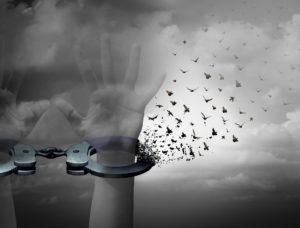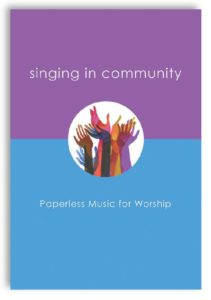Lutherans are taking action across the country! Below you will find our monthly State Advocacy Newsletter. Share with your friends!
ELCA Advocacy Office, Washington, D.C.
The Rev. Amy Reumann, director
ELCA.org/advocacy
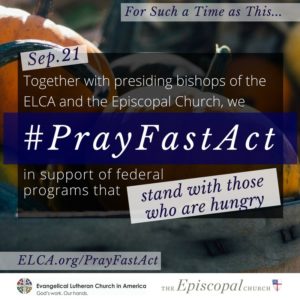 FOR SUCH A TIME AS THIS: The day of fasting and action this month is Thursday, Sept. 21. This month, we focus on programs that help end hunger and offer critical nutrition resources for working families in need. Proven and traditional support such as the Supplemental Nutrition Assistance Program (SNAP) and child nutrition programs have helped reduce hunger and food insecurity for decades. Looming federal decisions to cut these programs could leave thousands, if not millions, unsure of where their next meal may come from. Food security gives children and adults the fundamental elements needed to grow, thrive and succeed. As churches and places of worship dedicated to ending hunger, we call on our national leaders to maintain programs for struggling low-income households.
FOR SUCH A TIME AS THIS: The day of fasting and action this month is Thursday, Sept. 21. This month, we focus on programs that help end hunger and offer critical nutrition resources for working families in need. Proven and traditional support such as the Supplemental Nutrition Assistance Program (SNAP) and child nutrition programs have helped reduce hunger and food insecurity for decades. Looming federal decisions to cut these programs could leave thousands, if not millions, unsure of where their next meal may come from. Food security gives children and adults the fundamental elements needed to grow, thrive and succeed. As churches and places of worship dedicated to ending hunger, we call on our national leaders to maintain programs for struggling low-income households.
‘GOD’S WORK. OUR HANDS’ SUNDAY: ELCA Advocacy has prepared several congregation resources for those interested in including advocacy on their day of service on 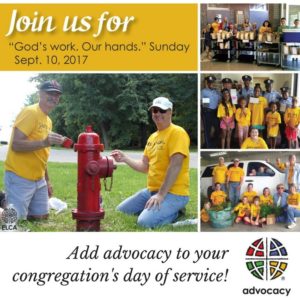 Sept. 10. Congregations and volunteers are encouraged to participate in letter-writing campaigns to their lawmakers on critical issues, such as: hunger, international aid, care for creation and more.
Sept. 10. Congregations and volunteers are encouraged to participate in letter-writing campaigns to their lawmakers on critical issues, such as: hunger, international aid, care for creation and more.
Preparing advocacy letters for a group activity is easy! Simply:
- Print out copies for your group or congregation. *Be sure to make three for each person if you want to write to both Senators and Representative!
- Fill out the member of Congress’ name and address info.
- Write your own personalized message in the body of the letter, sharing why this issue is important for you or your congregation.
- Send the completed letters to ELCA Advocacy (instructions on the letter PDF).
Interested congregations can download sample letters to fill out on the “God’s work. Our hands.” Sunday resource webpage.
DACA STATEMENT: The Trump administration announced on Sept. 5 the plan to end the Deferred Action for Childhood Arrivals (DACA) program with a six-month delay on implementation. The program has allowed nearly 800,000 “Dreamers” to have a temporary work permits, driver’s licenses and student aid, with the vast majority now contributing to the U.S. workforce. If Congress fails to pass a bill that protects DACA recipients, these young people will be at risk for deportation.
Sen. Lindsay Graham, R-S.C., who has sponsored two bills that would grant lawful status to Dreamers, has indicated that he will be pushing to pass a legislative solution to protect them. House Speaker Paul Ryan, R-Wis., has likewise supported paths to citizenship and immigration reform in the past, but passing an overhaul bill in Congress will be a challenge. ELCA Presiding Bishop Elizabeth Eaton shared a statement with lawmakers on Capitol Hill following the DACA announcement. Meanwhile, ELCA partner Lutheran Immigration and Refugee Services (LIRS) issued a statement, as well as the corresponding LIRS action alert calling in support of passing the 2017 DREAM Act. As Congress discusses possible next steps, ELCA Advocacy will continue to advocate to protects Dreamers and other vulnerable communities.
Lutheran Office for World Community, United Nations, New York, N.Y.
Dennis Frado, director
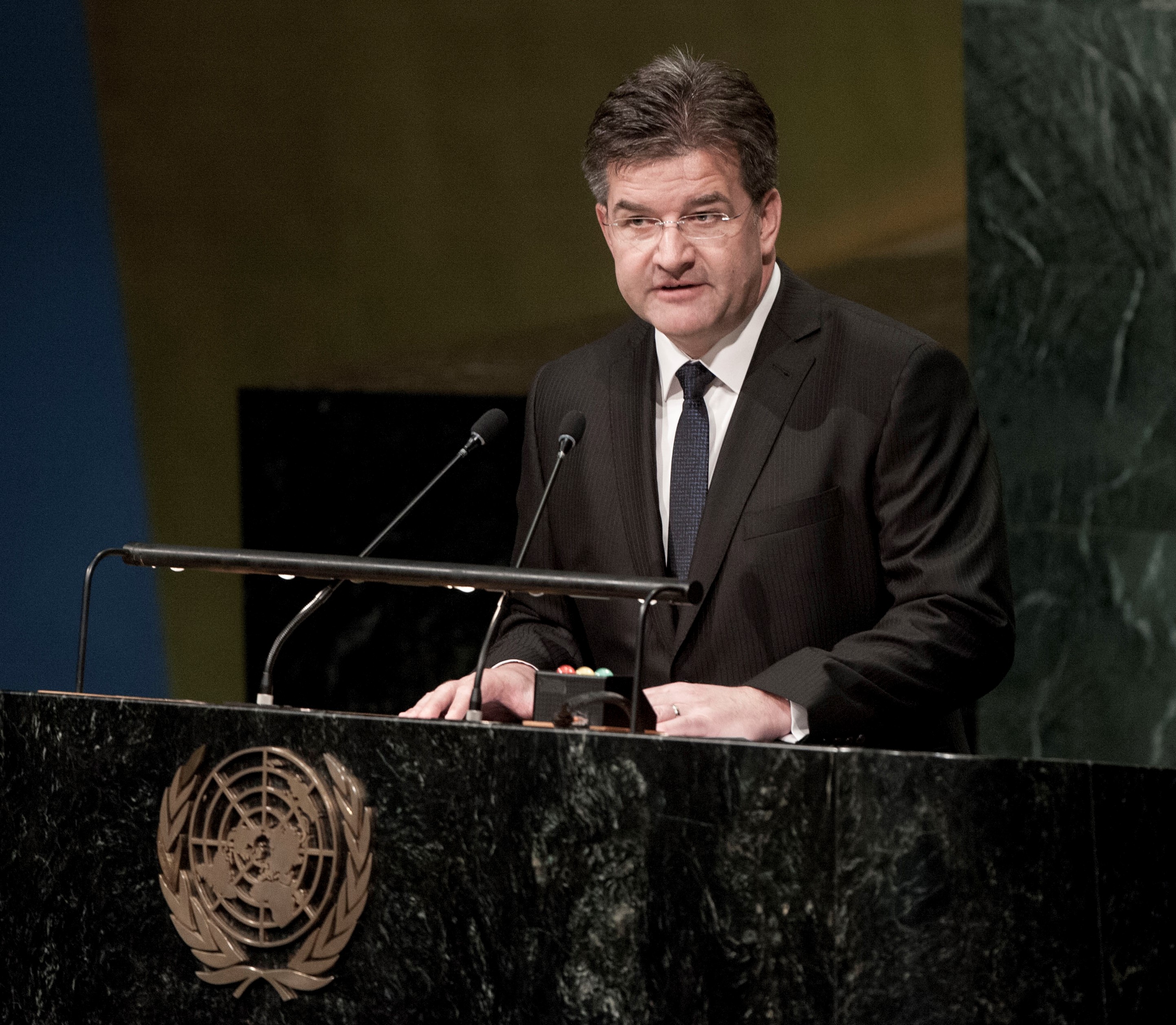 |
Election of the President of the General Assembly for the seventy-second session
|
U.N. GENERAL ASSEMBLY: In the coming weeks, the 72nd session of the U.N. General Assembly will convene under Miroslav Lajčák, minister of foreign and European affairs of Slovakia. Lajčák has proposed “focusing on people: striving for peace and a decent life for all on a sustainable planet” as the theme for this year’s general debate. The General Assembly also will hold several thematic meetings:
High Level Meeting on New Urban Agenda and UN-Habitat, Sept. 5-Sept. 6
High-level Forum on the Culture of Peace, Sept. 7
Progress made on SDG implementation during 71st Session, Sept. 8
Global Plan of Action to Combat Trafficking in Persons, Sept. 27-Sept. 28
OTHER EVENTS LOWC WILL JOIN:
“Leading by Example: Faith and HIV Testing,” interfaith service and testimonies, sponsored by the World Council of Churches–Ecumenical Advocacy Alliance with the support of UNAIDS and the President’s Emergency Plan for AIDS Relief (PEPFAR) on Sept.12.
Interfaith prayer breakfast on “fostering partnerships for fast tracking access to testing and treatment to infants, children and adolescents,” sponsored by the World Council of Churches, UNAIDS and PEPFAR on Sept. 13.
California
Mark Carlson, Lutheran Office of Public Policy
loppca.org
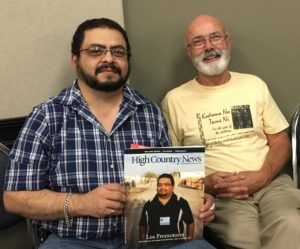 HOSPITALITY AND HATE: On an ugly and sad Saturday in Charlottesville, an amazing gathering of California’s diversity gathered in the social hall at St. John’s Lutheran Church in Sacramento, where the Lutheran Office of Public Policy–California was site host for the statewide meeting of the California Environmental Justice Coalition. From Calexico through Coachella (photo), the rural San Joaquin Valley, West Oakland, Bayview (SF), and an Indian rancheria in Mendocino County, the group met to build community and momentum and prepare for meetings with state agencies and legislators on a variety issues.
HOSPITALITY AND HATE: On an ugly and sad Saturday in Charlottesville, an amazing gathering of California’s diversity gathered in the social hall at St. John’s Lutheran Church in Sacramento, where the Lutheran Office of Public Policy–California was site host for the statewide meeting of the California Environmental Justice Coalition. From Calexico through Coachella (photo), the rural San Joaquin Valley, West Oakland, Bayview (SF), and an Indian rancheria in Mendocino County, the group met to build community and momentum and prepare for meetings with state agencies and legislators on a variety issues.
LEGISLATIVE UPDATE: The first half of the 2017-2018 session of the California Legislature concludes Sept. 15, and Gov. Jerry Brown has until Oct. 15 to act on bills that reach his desk. LOPP-CA hosted the August lobby day for California Interfaith Power 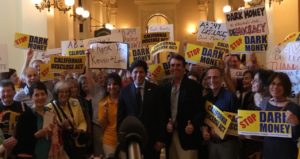 & Light and participated in the Green California lobby day and awards reception. LOPP-CA-supported bills to reform the bail system have been held until next year. Requiring a two-thirds vote, the outlook is shaky for long-negotiated legislation to add a small charge to water bills to support drinking water cleanup and affordability for low-income Californians. Other two-thirds vote, “heavy lift” legislation, including measures to place a low-income housing bond and a parks-for-all bond on the November 2018 ballot, and reform campaign finance reporting for ballot measures, are current priorities. Mark Carlson, director, spoke at a capitol lawn rally for the DISCLOSE Act, asserting that we will not let the mountain of dark money eclipse the Range of Light.
& Light and participated in the Green California lobby day and awards reception. LOPP-CA-supported bills to reform the bail system have been held until next year. Requiring a two-thirds vote, the outlook is shaky for long-negotiated legislation to add a small charge to water bills to support drinking water cleanup and affordability for low-income Californians. Other two-thirds vote, “heavy lift” legislation, including measures to place a low-income housing bond and a parks-for-all bond on the November 2018 ballot, and reform campaign finance reporting for ballot measures, are current priorities. Mark Carlson, director, spoke at a capitol lawn rally for the DISCLOSE Act, asserting that we will not let the mountain of dark money eclipse the Range of Light.
Colorado
Peter Severson, Lutheran Advocacy Ministry–Colorado
Lam-co.org
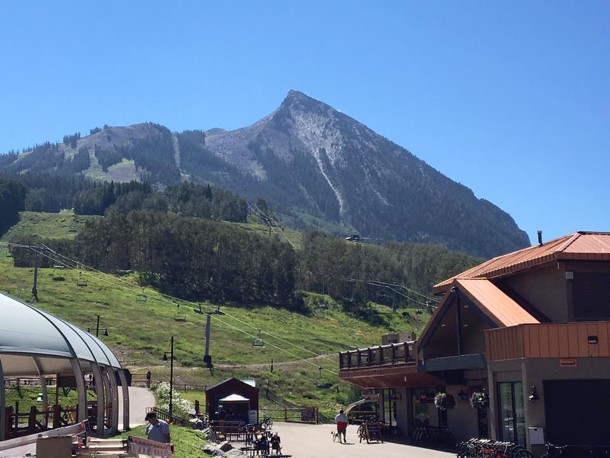 |
Mount Crested Butte, Colo.
|
ANTI-POVERTY CONFERENCE: The Colorado Community Action Association held their annual anti-poverty conference Aug. 7-11 in Crested Butte. Lutheran Advocacy was present alongside government officials, direct-service providers, advocates and organizers for four days of learning and relationship-building in service of fighting the root causes of poverty in Colorado.
Presenters focused on a variety of issues, including policy mapping, affordable housing development and funding, using data in health policy making, and building relationships of trust in rural communities, among many other topics. We’re thankful to the CCAA for gathering this diverse group together to address critical human needs in our state.
FALL EVENTS: Lutheran Advocacy is preparing for several events this fall, including the Rocky Mountain Synod Theological Conference Sept. 18-21 in Colorado Springs. We are cosponsoring the Colorado Social Legislation Committee Fall Forum during the final week in October, which will focus on the impact of the federal budget on Colorado. And we’ll be traveling around Front Range communities to visit ministries and congregations to share updates on our advocacy work, including Greeley, Longmont, Broomfield and Denver. Keep in touch through our email list, Facebook page and Twitter to get the latest updates!
Minnesota
Tammy Walhof, Lutheran Advocacy–Minnesota
lutheranadvocacymn.org
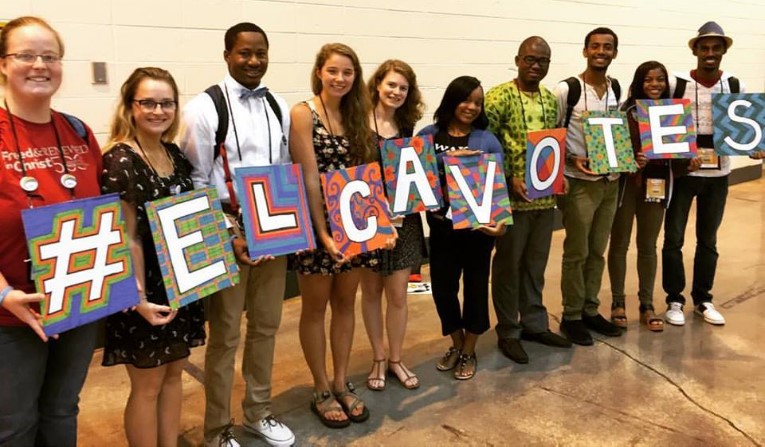 |
Kendrick Dwight, holding the “L,” is the third from the left.
|
HUNGER ADVOCACY FELLOW: Please welcome Kendrick Dwight as our new Hunger Advocacy Fellow. More information about Kendrick and the work he will be doing with congregations and hunger teams coming soon!
FAITH LEADER LETTER ON CLEAN ENERGY: The Renewable Energy Standard Minnesota passed in 2007 with broad bipartisan support mandated that 25 percent of Minnesota’s energy come from renewable sources by 2025 (30 percent for Xcel Energy). Minnesota is on target to exceed the mandate, and various studies have shown that Minnesota could dramatically increase renewable energy use without sacrificing reliability or causing grid problems. Wind is Minnesota’s cheapest energy, and now solar is also competitive. Bipartisan legislation for an updated standard of 50 percent renewable energy by 2030 was introduced during the 2017 legislative session. Unfortunately, several legislators oppose these changes based on outdated concerns, cost misunderstandings, and significant pressure from fossil-fuel campaign contributors. Lutheran Advocacy-MN, Minnesota Interfaith Power and Light, ISAIAH, and the EcoFaith Networks from the Minneapolis Area Synod and the Northeastern Minnesota Synod, ask church leaders to sign a letter and add a note for legislators in support of the improved standard. An educational event is also being planned for Oct. 24.
PROTECT OUR HOMES: Some Homes for All Coalition groups, including Lutheran Advocacy-MN, have formed “Protect our Homes” to address federal affordable housing concerns. In August, we met with Rep. Keith Ellison to talk about severe cuts proposed to housing programs and to consider what can be done in Congress to save them. Watch for upcoming action alerts!

LA-MN Director, Tammy Walhof, is on the far left in pink
New Mexico
Ruth Hoffman, Lutheran Advocacy Ministry–New Mexico
lutheranadvocacynm.org/
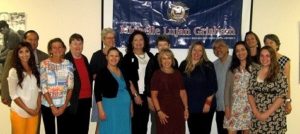 FARM BILL LISTENING SESSION: U.S. Rep. Michelle Lujan Grisham, D-N.M., recently held a listening session about the federal farm bill. She is a member of the House Committee on Agriculture, which has primary responsibility for the development of the legislation to reauthorize the farm bill, which includes the SNAP (Supplemental Nutrition Assistance Program) as well as other vital nutrition programs.
FARM BILL LISTENING SESSION: U.S. Rep. Michelle Lujan Grisham, D-N.M., recently held a listening session about the federal farm bill. She is a member of the House Committee on Agriculture, which has primary responsibility for the development of the legislation to reauthorize the farm bill, which includes the SNAP (Supplemental Nutrition Assistance Program) as well as other vital nutrition programs.
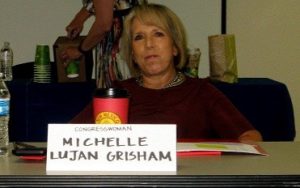
LAM-NM was invited to participate in the session and to provide input about crucial provisions of the farm bill. LAM-NM Director Ruth Hoffman made these points: not enacting new work requirements for SNAP recipients, rescinding the SNAP ABAWD work requirements, increasing the monthly allotments for SNAP recipient,; making no cuts to SNAP eligibility standards, and not block granting SNAP funding.
Ohio
Nick Bates, The Faith Coalition for the Common Good
Nick@HungerNetOhio.org

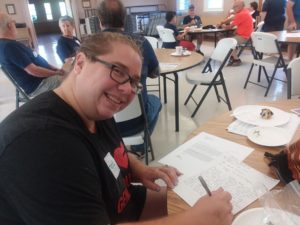 HUNGER NETWORK IN OHIO: We would like to thank three congregations in the Clintonville neighborhood of Columbus for their public witness and advocacy over the weekend on hunger issues. Clinton Heights Lutheran Church, North Community Lutheran Church, and Maple Groove United Methodist Church sit within 2.5 miles of each other along the main corridor of High Street. The Lutheran congregations sponsored a hunger walk on Saturday where they witnessed to the community and raised awareness about hunger in Ohio. They also collected food and money to support local hunger ministries. On Sunday, Maple Grove sponsored their food-for-all Sunday, where the congregation dedicated their worship time to service projects.
HUNGER NETWORK IN OHIO: We would like to thank three congregations in the Clintonville neighborhood of Columbus for their public witness and advocacy over the weekend on hunger issues. Clinton Heights Lutheran Church, North Community Lutheran Church, and Maple Groove United Methodist Church sit within 2.5 miles of each other along the main corridor of High Street. The Lutheran congregations sponsored a hunger walk on Saturday where they witnessed to the community and raised awareness about hunger in Ohio. They also collected food and money to support local hunger ministries. On Sunday, Maple Grove sponsored their food-for-all Sunday, where the congregation dedicated their worship time to service projects.
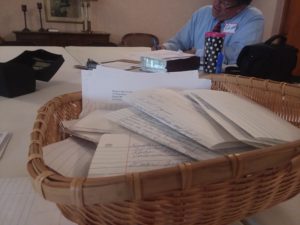 All three congregations understand that we cannot just feed people today but must also engage policymakers on these issues. Members wrote letters to Sen. Rob Portman, encouraging him to protect the Supplemental Nutrition Assistance Program and other programs that address hunger. Our budgets are moral documents, and we need to make sure our legislators know this.
All three congregations understand that we cannot just feed people today but must also engage policymakers on these issues. Members wrote letters to Sen. Rob Portman, encouraging him to protect the Supplemental Nutrition Assistance Program and other programs that address hunger. Our budgets are moral documents, and we need to make sure our legislators know this.
The Hunger Network will gladly help other congregations identify ways to incorporate advocacy into their charity projects. As key hunger advocates around Ohio have repeatedly said, “We cannot foodbank our way out of hunger. We need a public commitment to it.” Please contact us at Nick@Hungernetohio.com with any questions or to request a facilitator for an advocacy project.
Pennsylvania
Tracey DePasquale, Lutheran Advocacy–Pennsylvania
Lutheranadvocacypa.org
In August, the state budget remained half-complete, with a spending plan passed, and a revenue package awaiting action by the House, which remained on recess. The House is scheduled to return to Harrisburg Sept. 11. Lawmakers are facing a $2.3 billion deficit. The Senate passed a revenue plan in late July that included a variety of revenue sources, including a severance tax on Marcellus Shale that was lower than that requested by the governor in return for rollbacks on environmental protections – a trade that LAMPa opposes. Among House proposals being circulated to close the gap are attempts to transfer money from non-General Fund accounts – in effect taking money already set aside for specific projects and diverting it to the overall budget.
LAMPa Director Tracey DePasquale had the opportunity to update the board of directors of SpiriTrust Lutheran on Aug. 17 about the LAMPa agenda and what is happening and not happening in Harrisburg. LAMPa remains grateful for the continued support and partnership with SpiriTrust in caring for our neighbors in southcentral Pennsylvania.
On Aug. 20, LAMPa offered two advocacy workshops at the convention of the Lower Susquehanna Synod Women of the ELCA and thanked them for their work against human trafficking, particularly sex trafficking of minors in Pennsylvania.
In addition, LAMPa has been preparing congregations around the state to add advocacy to their “God’s Work. Our Hands.” Sunday, Sept. 10, and planning for our annual policy council retreat later this month.
Southeastern Synod
Hilton Austin, Director
We continue to encourage and support congregations with, or in the process of developing, advocacy teams, while continuing to educate folks on current social issues. Melanie Johnson has been busy making presentations to congregations interested in Circle of Welcome. At present, there are two Southeastern Synod congregations involved, St John’s and Resurrection (Trinity is doing the same thing; they just started pre-program); I am sure that number will continue to grow.
“FOR SUCH A TIME …” : On Aug. 26, I attended Atlantans Building Leadership for Empowerment’s (ABLE) “For Such A Time As This” banquet. That night it was announced that the Rev. Ronald Bonner, assistant to the bishop, is the new president of ABLE. This will bring a new dimension to our advocacy partnership; Ron and I have already discussed how we can expand this relationship across the synod. In September, we will have an exhibit at the Women of the ELCA convention, and in October, we will be at the SES Leadership Convocation.
IMMIGRATION: We are still in the process of gathering folks to participate in the AMMPARO Guardian Angel program in Georgia. Twelve people will participate by accompanying immigrants at the Atlanta Immigration Court. They will work in pairs, one must speak Spanish; training will be provided by AMMPARO. Mary Campbell will set that up as soon as we have the 12 people; we are well on our way.
As Congress comes back from recess, we are mobilizing all of our people to react to the important issues that affect many of our neighbors. We are here “For Such A Time As This.”
Virginia
Kim Bobo, Virginia Interfaith Center for Public Policy
virginiainterfaithcenter.org
The Rev. Juan Gutierrez Palomino was deported last week to Peru, a country he hasn’t been to for 15 years. His wife and children in Dumfries, all U.S. citizens, are left without their father, husband and breadwinner. VICPP had been working for his release and now is helping his family. Palomino was detained by Immigration and Customs Enforcement at a regular check-in, as he had been doing faithfully for years, and was not granted a day in court to make his case. Deporting pastors, fathers, husbands and community members serves no purpose other than amplifying fear and distrust in the community. In the wake of the Aug. 11-12 tragedy in Charlottesville, it’s clear Virginia and the nation have not sufficiently grappled with our racist history and systemic racism. If our democracy is going to stand and our nation to prosper, we must find new ways to address our history and break down barriers that harm and exclude our neighbors based on race, religion or ethnicity.
VICPP has a petition online that calls on the Legislature to take action to welcome all, specifically in tracking hate crimes and establishing a task force to address racism and exclusion in Virginia. You can sign the petition here. Our Richmond Chapter is partnering with the Richmond Office of Community Wealth Building to develop a Living Wage Certification program. We are also developing this program in Charlottesville and Alexandria. Find a copy of the application on the website, or email Kim@virginiainterfaithcenter.org for more details. VICPP’s Annual Meeting and Awards Celebration will be Dec. 7 in Richmond.
Wisconsin
Cindy Crane, Lutheran Office for Public Policy in Wisconsin
Loppw.org
CARE FOR GOD’S CREATION: LOPPW is advocating for legislators to amend a bill, which includes diminishing environmental regulations for companies that build in electronics and information technology manufacturing zone, to not ease any of the state environmental regulations it proposes to ease. The director attended the public hearing for the bill and also spoke on the radio about our concerns. Here is LOPPW’s news release: thewheelerreport.com/wheeler_docs/files/0830loppwi.pdf.
BISHOPS AND ADVISORY COUNCIL: The director recently met with all six bishops to prepare for our annual advisory council/staff retreat to discuss LOPPW’s priorities. The bishops expressed concerns about poverty and opioid abuse in their communities, the treatment of people who are immigrants and refugees, human trafficking and affordable housing. The director began working with an advisory council member to plan our September retreat.
ADVOCACY RETREAT FOR COLLEGE STUDENTS: The campus pastor at UW-Madison, a volunteer and the director are finalizing a flyer to advertise our Nov. 3-4 retreat for college students interested in taking leadership in advocacy. This will be an ELCA event advertised via our campus ministries in Wisconsin and the Upper Peninsula of Michigan, and it will include information on how young adults can be more involved in the ELCA. The retreat will be open to any interested student.
MONDAY QUOTES: LOPPW has invited people via our database and social media to send us quotes that inspire them. We share at least one quote we receive with a reflection on Mondays.
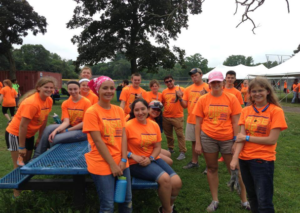 The Youth Gathering was a wonderful, faith-filled experience that left me with more memories and friends than I will ever get in a lifetime. In the summer of 2015, I went to the Gathering in Detroit. Before the trip, I heard many rumors of churches not going to Detroit because of the stigma surrounding the city. Honestly, I was a little apprehensive as well. As soon as my group got to Detroit, however, all of my preconceived notions were gone. Detroit was beautiful inside and out. Through many hardships, the city is still living and thriving one day at a time.
The Youth Gathering was a wonderful, faith-filled experience that left me with more memories and friends than I will ever get in a lifetime. In the summer of 2015, I went to the Gathering in Detroit. Before the trip, I heard many rumors of churches not going to Detroit because of the stigma surrounding the city. Honestly, I was a little apprehensive as well. As soon as my group got to Detroit, however, all of my preconceived notions were gone. Detroit was beautiful inside and out. Through many hardships, the city is still living and thriving one day at a time.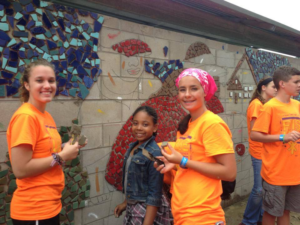 She was a local kid who lived in the neighborhood where we were working. Every day for three days, Hope came out and helped create the beautiful mosaics on the back of the dug outs. Hope came over to my group’s dugout and asked if she could help. A system was soon put in place where I would put the mortar on the back of the tile and Hope would choose the final resting place of the tile on the dugout. For over four hours, it was a beautiful symphony of working together to beautify a city so surrounded by negativity and media-bashing. Hope was living out the true meaning of her name in creating beauty in her city and community.
She was a local kid who lived in the neighborhood where we were working. Every day for three days, Hope came out and helped create the beautiful mosaics on the back of the dug outs. Hope came over to my group’s dugout and asked if she could help. A system was soon put in place where I would put the mortar on the back of the tile and Hope would choose the final resting place of the tile on the dugout. For over four hours, it was a beautiful symphony of working together to beautify a city so surrounded by negativity and media-bashing. Hope was living out the true meaning of her name in creating beauty in her city and community.


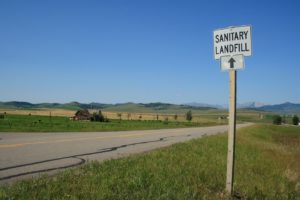
 Ruth Ivory-Moore is ELCA’s Program Director, Environment and Energy. She believes it a blessing to have the opportunity to be able to combine her engineering and legal education with her Christian beliefs to advocate and to work to care. She operates in the realm of hope, that is , she believes that the faith-based community has a unique opportunity in the current political climate to be the voice of reason and persuasion.
Ruth Ivory-Moore is ELCA’s Program Director, Environment and Energy. She believes it a blessing to have the opportunity to be able to combine her engineering and legal education with her Christian beliefs to advocate and to work to care. She operates in the realm of hope, that is , she believes that the faith-based community has a unique opportunity in the current political climate to be the voice of reason and persuasion.













